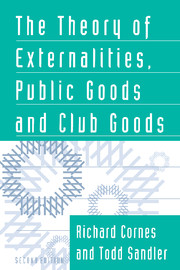Book contents
- Frontmatter
- Contents
- List of tables and figures
- Preface
- Part I Introduction to the theory of externalities, public goods, and club goods
- Part II Externalities
- Part III Public goods
- Part IV Clubs and club goods
- 11 Homogeneous clubs and local public goods
- 12 Clubs in general
- 13 Institutional forms and clubs
- 14 Game theory and club goods
- 15 Uncertainty and the theory of clubs
- 16 Intergenerational clubs
- Part V Applications and future directions
- References
- Author index
- Subject index
16 - Intergenerational clubs
Published online by Cambridge University Press: 05 June 2012
- Frontmatter
- Contents
- List of tables and figures
- Preface
- Part I Introduction to the theory of externalities, public goods, and club goods
- Part II Externalities
- Part III Public goods
- Part IV Clubs and club goods
- 11 Homogeneous clubs and local public goods
- 12 Clubs in general
- 13 Institutional forms and clubs
- 14 Game theory and club goods
- 15 Uncertainty and the theory of clubs
- 16 Intergenerational clubs
- Part V Applications and future directions
- References
- Author index
- Subject index
Summary
This chapter is concerned with clubs in which multiple overlapping generations of members share a club good. For such intergenerational clubs, the life span of the shared good exceeds the membership span of the founding members, so that the good is shared among generations until the time span of the good is exhausted. Many clubs are intergenerational in character and deserve study. In particular, decisions with respect to city management, national parks, highways, and the design of school districts can profit from the principles of intergenerational clubs developed here. But the list does not end there. Universities are intergenerational clubs, since multiple generations of students and faculties share the campus. Even “Spaceship Earth” can be thought of as an intergenerational club good, shared by humans and other earth-dwelling inhabitants. This analogy holds whenever the earth's population is endogenous. The utilization of the electromagnetic spectrum is yet another example. Fraternities, professional associations, and religious groups are still other examples.
A class of examples of much current interest includes intergenerational commons, such as hunting grounds, the oceans, the troposphere, the stratosphere, and tropical forests. Consider a tract of tropical forest owned in common by a tribe of indigenous people who use and pass on the tract and its species from one generation to another. In essence, the generations and their shared tract constitute an intergenerational club. If current tribe members are interested in their children's well-being, or will be dependent on their children to support them during retirement, then each generation will be concerned about atemporal and intertemporal implications of their use of the forest.
- Type
- Chapter
- Information
- The Theory of Externalities, Public Goods, and Club Goods , pp. 461 - 480Publisher: Cambridge University PressPrint publication year: 1996



